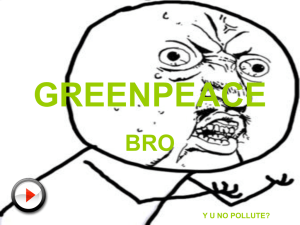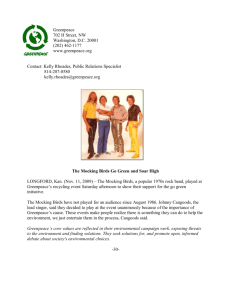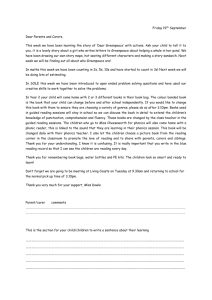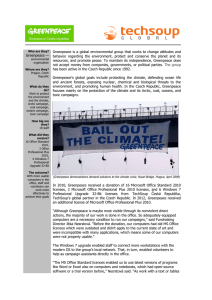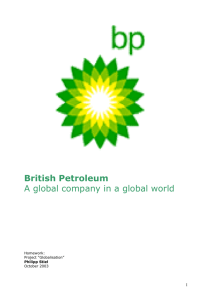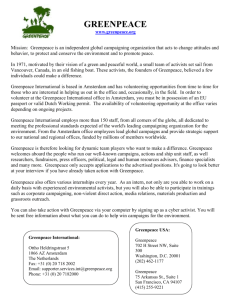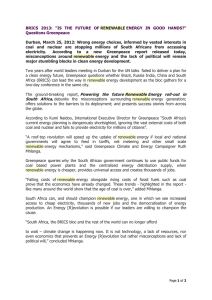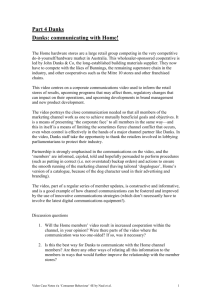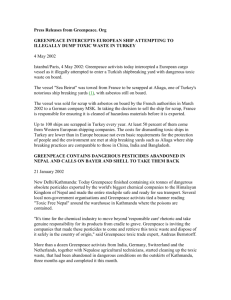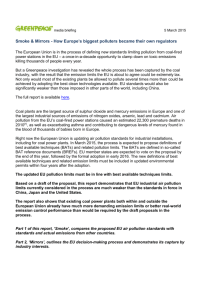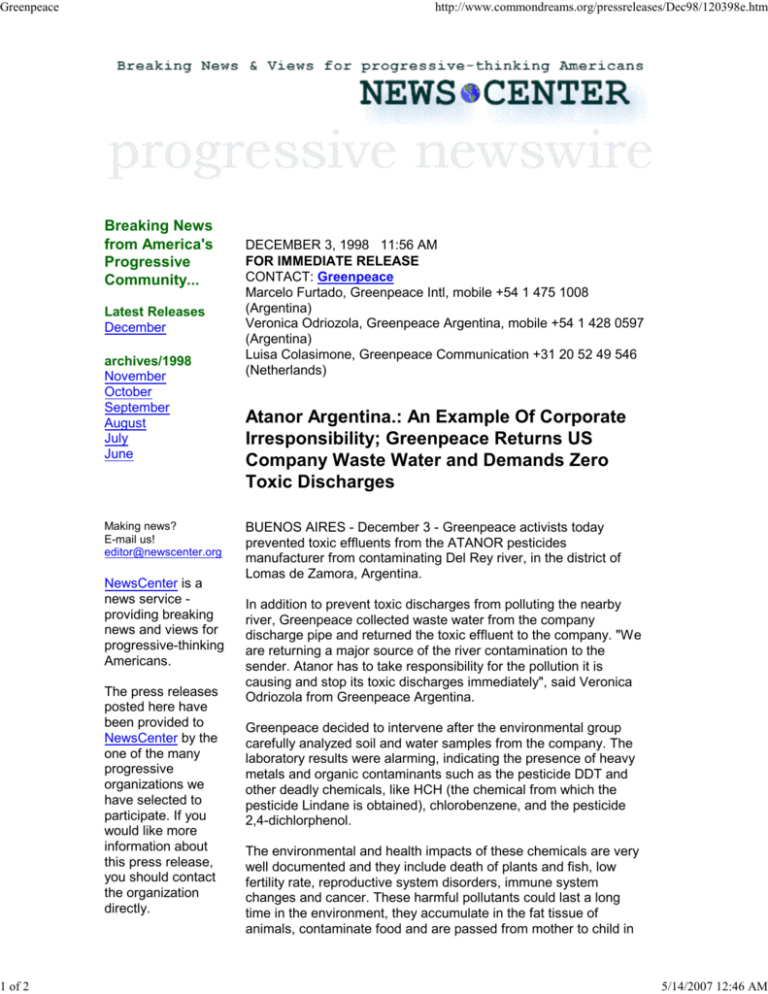
Greenpeace
1 of 2
http://www.commondreams.org/pressreleases/Dec98/120398e.htm
Breaking News
from America's
Progressive
Community...
Latest Releases
December
archives/1998
November
October
September
August
July
June
Making news?
E-mail us!
editor@newscenter.org
NewsCenter is a
news service providing breaking
news and views for
progressive-thinking
Americans.
The press releases
posted here have
been provided to
NewsCenter by the
one of the many
progressive
organizations we
have selected to
participate. If you
would like more
information about
this press release,
you should contact
the organization
directly.
DECEMBER 3, 1998 11:56 AM
FOR IMMEDIATE RELEASE
CONTACT: Greenpeace
Marcelo Furtado, Greenpeace Intl, mobile +54 1 475 1008
(Argentina)
Veronica Odriozola, Greenpeace Argentina, mobile +54 1 428 0597
(Argentina)
Luisa Colasimone, Greenpeace Communication +31 20 52 49 546
(Netherlands)
Atanor Argentina.: An Example Of Corporate
Irresponsibility; Greenpeace Returns US
Company Waste Water and Demands Zero
Toxic Discharges
BUENOS AIRES - December 3 - Greenpeace activists today
prevented toxic effluents from the ATANOR pesticides
manufacturer from contaminating Del Rey river, in the district of
Lomas de Zamora, Argentina.
In addition to prevent toxic discharges from polluting the nearby
river, Greenpeace collected waste water from the company
discharge pipe and returned the toxic effluent to the company. "We
are returning a major source of the river contamination to the
sender. Atanor has to take responsibility for the pollution it is
causing and stop its toxic discharges immediately", said Veronica
Odriozola from Greenpeace Argentina.
Greenpeace decided to intervene after the environmental group
carefully analyzed soil and water samples from the company. The
laboratory results were alarming, indicating the presence of heavy
metals and organic contaminants such as the pesticide DDT and
other deadly chemicals, like HCH (the chemical from which the
pesticide Lindane is obtained), chlorobenzene, and the pesticide
2,4-dichlorphenol.
The environmental and health impacts of these chemicals are very
well documented and they include death of plants and fish, low
fertility rate, reproductive system disorders, immune system
changes and cancer. These harmful pollutants could last a long
time in the environment, they accumulate in the fat tissue of
animals, contaminate food and are passed from mother to child in
5/14/2007 12:46 AM
Greenpeace
2 of 2
http://www.commondreams.org/pressreleases/Dec98/120398e.htm
the womb and through mothers' milk. These persistent poisons are
know as Persistent Organic Pollutants (POPs).
The Atanor plant manufactures chlorinated pesticides and is based
in the river complex Matanza-Riachuelo, a severely contaminated
waterway and well known polluted "hot-spot" in Argentina. Atanor is
a member of the chemical industry program of "Responsible Care",
a famous corporate code of responsibility often used as pure
greenwash.
The company was privatized in the 1980s. In March 1997, Albaugh
Inc. of Akeny Iowa bought 51 % of Atanor for $58.5 million. Dennis
Albaugh, president of the company, was quoted as saying "This will
enable us to bring a lot of new products into the United States."
Over 6.5 million pounds of the pesticide 2,4-D were shipped to the
U.S. in the last 12 months.
"Atanor is just another example of a global polluter. Their toxic
discharges poison people here and around the planet as these
contaminants travel around the globe. This irresponsible practice
must come to an end", said Marcelo Furtado of Greenpeace
International.
The MV Greenpeace vessel is currently in Argentina launching a
global tour to expose the damage caused by highly polluting and
persistent poisons. The expedition will head to Brazil in January
and later on to the Mediterranean, Europe and Asia.
Over 100 nations in conjunction with the United Nations
Environmental Program (UNEP) are currently negotiating a plan to
reduce and eliminate these POPs from the world. They are dealing
with an initial priority group of 12 chemicals that include DDT,
PCBs and Dioxins. The next meeting will take place in Nairobi in
January of 1999. Greenpeace is calling countries around the world
to take responsibility and immediately clean-up the existing hot
spots, ban all toxic chemicals and promote clean alternatives world
wide.
###
NewsCenter | E-Mail the Editor
© Copyrighted 1997/1998. All rights Reserved.
NewsCenter is a project of Common Dreams
5/14/2007 12:46 AM

